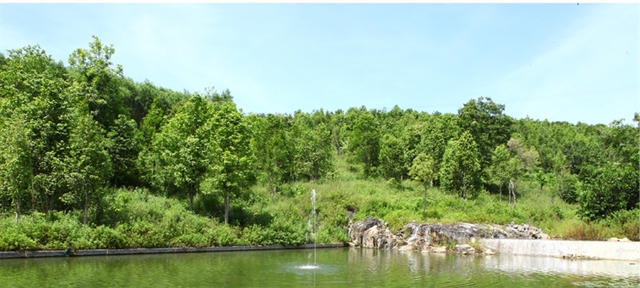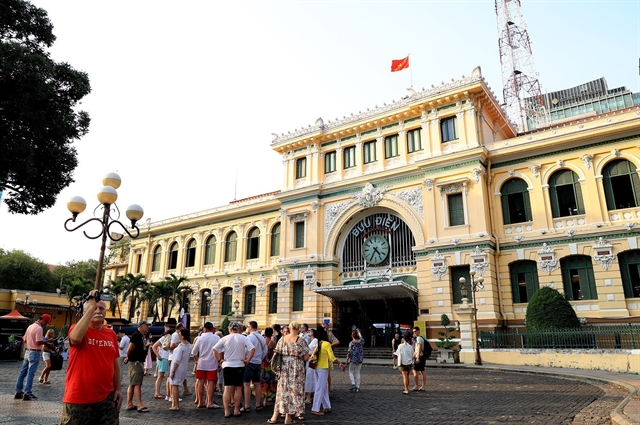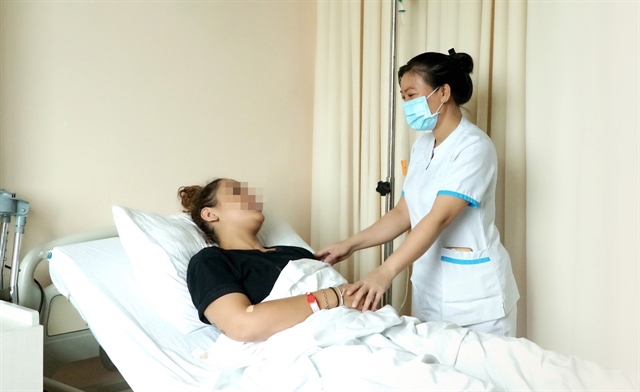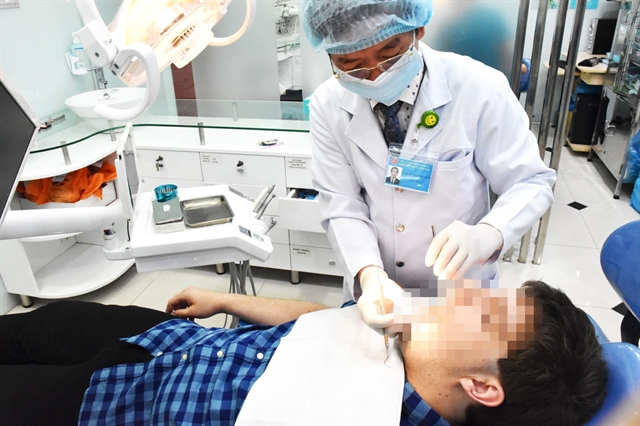 Sunday/Weekend
Sunday/Weekend

 |
| Foreign visitors at the HCM City Central Post Office. VNA/VNS Photo Hồng Đạt |
Thu Hằng
Tourism and health authorities in HCM City are actively promoting medical tourism packages in an effort to make the city an attractive destination for this type of tourism.
With 131 healthcare establishments, highly-qualified medical professionals, top-notch technologies, and affordable costs, the city has enormous potential to become a preferred global destination for medical tourists, Bùi Thị Ngọc Hiếu, deputy director of the city's Department of Tourism, says.
The number of overseas Vietnamese and foreigners travelling to Việt Nam for medical checks and treatment has increased steadily.
Around 300,000 now visit annually, helping generate revenues of US$2 billion, according to the department.
HCM City received nearly half the medical tourists coming to the country.
Many of the city's hospitals offer a wide range of specialised treatments such as heart surgeries, organ transplants, cosmetic surgeries, dental surgeries, and infertility treatments, she adds.
Facilities that meet international healthcare standards include the University Medical Centre, the Heart Institute, the Hospital of Odonto-Stomatology, the Traditional Medicine Hospital, Từ Dũ Hospital, Gia An 115 Hospital, Vinmec, FV Hospital, and the City International Hospital.
The City International Hospital in Bình Tân District receives more than 30,000 foreigners a year, with Cambodian patients accounting for 90 per cent.
Nguyễn Thị Kim Thúy, head of the hospital’s planning and marketing department, says the 320-bed hospital with skilled medical professionals and state-of-the-art facilities provides high-quality treatment in 21 specialties.
Separate rooms are provided to these patients, who get dedicated assistance from Cambodian staff, she adds.
 |
| A foreign patient is treated at the City International Hospital in HCM City. Photo courtesy of the hospital |
Coordinated efforts
To realise the city’s untapped potential for medical tourism, the municipal Tourism and Health departments last month launched a marketing and promotion programme that has drawn the participation of 50 health establishments, spas, travel agencies, and accommodation providers.
At least 30 packages that combine medical treatment with visits to popular tourist destinations are expected to be rolled out by year end.
Tăng Chí Thượng, director of the Department of Health, says most medical tourists come for cosmetic and dental surgeries and traditional medicinal and infertility treatments.
"The city is focusing its efforts on turning into a specialised healthcare hub in Southeast Asia. This is also expected to reduce the number of [Vietnamese] patients travelling overseas for medical treatment," he says.
"But to develop medical tourism, coordination between the tourism and health sectors for delivery and promotion of services is key," he adds.
Đỗ Tân Khoa, director of the city-based Traditional Medicine Hospital, says: “The development of medical tourism will help boost the city’s economy and promote the quality of healthcare facilities and services.”
It is the first traditional medicinal hospital in the country to meet “Good Manufacturing Practice”, “Good Laboratory Practice” and “Good Storage Practice” standards, which means it ensures the quality of inputs and semi-finished and final products, he says.
Non-pharmacological treatments used in traditional medicine such as acupressure, acupuncture and thread embedding not only effectively help relieve aches and pains, but also mitigate the consequences of chronic pain such as insomnia, and anxiety, he says.
The hospital’s pharmacy department produces more than 240 herbal medicines and 50 other traditional medicine products.
Assoc. Prof. Hoàng Thị Diễm Tuyết, director of Hùng Vương Hospital, says an increasing number of foreigners and overseas Vietnamese are seeking infertility treatments in the city due to the high success rate and low cost of treatment.
Many hospitals are now attaining in vitro fertilisation (IVF) success rates of 50 per cent or more due to the application of advanced medical techniques, the same rates as in other countries in the region.
However, in Việt Nam the cost is only around a sixth of that in other countries, she says.
Health establishments need to upgrade their facilities and equipment to be able to compete with their rivals in popular medical tourism destinations in the region, she says.
Preferential policies are needed to retain skilled medical professionals, she adds.
 |
| A foreign patient is treated at the HCM City Hospital of Odonto-Stomatology. Photo courtesy of the hospital |
The HCM City Hospital of Odonto-Stomatology offers a wide range of dental care packages for tourists to combine their vacation with treatment.
It treats around 500 foreigners a year including many overseas Vietnamese who seek dental care here during their family visits to the city.
Nguyễn Đức Minh, its director, says the hospital constantly upgrades its facilities and uses the latest techniques in dentistry to improve its quality of treatment.
Huỳnh Phan Phương Hoàng, deputy director of Vietravel, says the company has developed medical tourism packages for visitors from Southeast Asian countries, with Cambodia being a key and promising market.
Dental holiday packages that are attractive to tourists are a focus of health tourism that it is developing, she adds. VNS